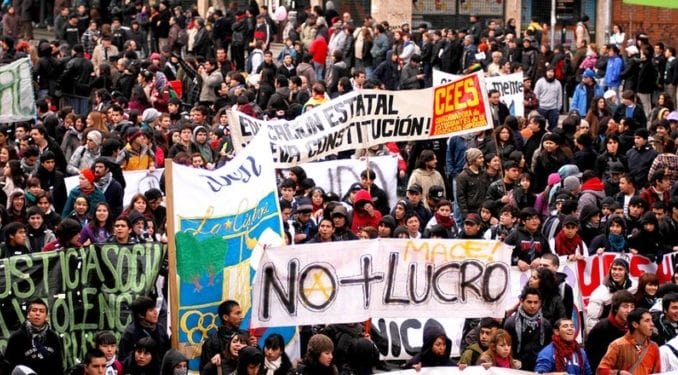
SANTIAGO – Thousands of students and teachers held Thursday a massive demonstration along the central Alameda Avenue in Santiago to denounce ‘profit-making’ in higher education, in the first protest under the month-old administration of conservative President Sebastian Pinera.
The organizers estimated around 120,000 participants in the demonstration that toured the center of Chile’s capital. Similar protests took place in the main cities of the country.

The march was called by the National Confederation of Students of Chile (Confech) to demand the end of profit in education, among other demands. Young people consider that higher education is still a business and they denounce that thousands of students and their families are indebted to banks, which they are forced to go to for their education.
Gathered in the Bustamante Park, huge columns of students advanced for several blocks of the main avenue in the center of the Chilean capital, with a high call not seen since the first student demonstrations in 2011.

“We marched against form and reform,” read one of hundreds of canvases raised by students, who for years claim public education, free and quality and now have their eyes on the prohibition of obtaining profits in the educational entities.
Incidentes e intervención de carabineros opaco la marcha que convocó a aproximadamente 200.000 personas a nivel nacional, específicamente 120.000 en Santiago, según informó la Confech vía Twitter y según la Intendencia, cerca de 30.000, informado también por ahí. @TallerRE2018 pic.twitter.com/NekK65tKq9
— Javiera Kessra (@JKessra) April 19, 2018
The marches, attended by students and professors, follow a recent decision by the country’s constitutional court to overturn a law that prohibited for-profit companies from controlling universities.
Profit-making from higher education is illegal in Chile. But critics have long claimed that some companies that operate universities have found ways to exploit loopholes in the law, allowing them to turn a profit without re-investing the money in reduced tuition or improved education.

The demands of the student movement “are still valid and remain the same,” said Sandra Beltrami, one of the Confech’s spokespersons. “We want to be in the classrooms, we want to have classes, we want to study a career in order to be someone in life and have a profession like many people in this country, and we cannot do it because there is still profit in Chile,” she added.
Banging drums, toting banners and sometimes throwing rocks and blocking traffic, students marched through downtown Santiago, occasionally sparking small confrontations with police, who used tear gas and water tanks to disperse the protesters. So far, the number of detainees has not been reported.
The first student protests broke out in 2011 during Piñera’s first government (2010-2014). Then, his successor, the socialist Michelle Bachelet (2014-2018) delineated a profound reform of this educational system, which remains a legacy of the dictatorship of Augusto Pinochet (1973-1990).

But the changes, such as the free provision for about a third of enrollment and the prohibition of selecting students in schools, were considered “insufficient” by the students, who promised to redouble their protests in the new government of Piñera, which started this March 11.
Piñera proposes boosting free technical education ahead of student protests
Earlier this week, after signing a bill to extend the policy of gratuity to about 13,000 students of technical institutes, Piñera denied that he has planned to turn back the benefits of free and said there will be no profit in education.
“I want to take this opportunity to make it abundantly clear that free education in higher education is here to stay and that there will be no gain in university higher education,” said the president.



